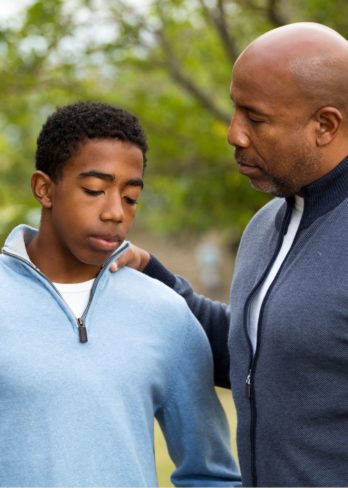

Helping Kids Cope After Separation and Divorce
Helping Kids Cope
Many kids and parents grieve the loss of the kind of family they had hoped for, and kids especially miss the presence of both parents and the family life they had. That’s why it’s common and very natural for some kids to hold out hope that their parents will someday get back together. You can reassure them that it’s OK to wish that mom Be and dad will reunite, but also explain the finality of your decisions.
Here are some ways to help kids cope with the upset of a divorce:
- Encourage honesty.Kids need to know that their feelings are important to their parents and that they’ll be taken
- Help them put their feelings into words. Kids’ behavior can often clue you into their feelings of sadness or anger. You might say: “It seems as if you’re feeling sad right now. Do you know what’s making you feel so sad?” Be a good listener, even if it’s difficult for you to hear what they have to say.
- Legitimize their feelings. Saying “I know you feel sad now” or “I know it feels lonely without dad here” lets kids know that their feelings are valid. It’s important to encourage kids to get it all out before you start offering ways to make it better. Let kids know it’s also OK to feel happy or relieved or excited about the future.
- Offer support. Ask, “What do you think will help you feel better?” They might not be able to name something, but you can suggest a few ideas — maybe just to sit together, take a walk, or hold a favorite stuffed animal. Younger kids might especially appreciate an offer to call daddy on the phone or to make a picture to give to mommy when she comes at the end of the day.
- Keep yourself healthy. For adults, separation and divorce are highly stressful. That pressure may be amplified by custody, property, and financial issues, which can bring out the worst in people.Finding ways to manage your own stress is essential for you and your entire family. Keeping yourself as physically and emotionally healthy as possible can help combat the effects of stress, and by making sure you’re taking care of your own needs, you can ensure that you’ll be in the best possible shape to take care of your kids.
- Keep the details in check. Take care to ensure privacy when discussing the details of the divorce with friends, family, or your lawyer. Try to keep your interactions with your ex as civil as possible, especially when you’re interacting in front of the kids.
- Get help. This is not the time to go it alone. Find a support group, talk to others who have gone through this, use online resources, or ask your doctor to refer you to other resources. Getting help yourself sets a good example for your kids on how to make a healthy adjustment to this major change. Help from a counselor, therapist, or friend will also maintain healthy boundaries with your kids
